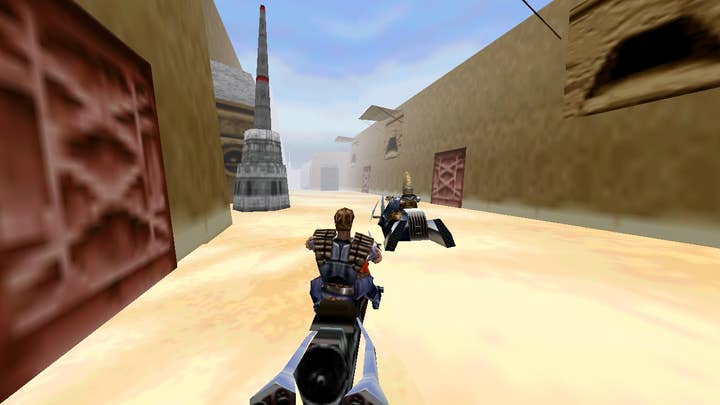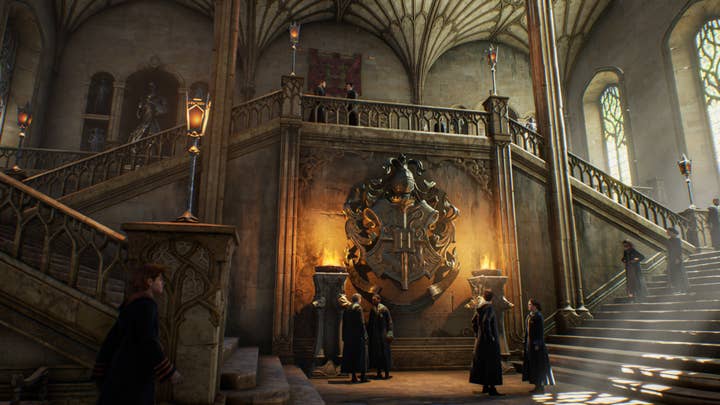Two decades later, the cross-media dream is a reality | Opinion
Publishers' notions of franchises that span games, movies, TV and other media to create an experience that's more than the sum of its parts has finally found its time
On the face of it, there aren't too many points of comparison between The Last of Us and Hogwarts Legacy, beyond the fact that they're both very successful at the moment.,
The critically acclaimed HBO drama adaptation of The Last of Us has boosted sales of the games, while Hogwarts Legacy has become one of the fastest-selling games in years – but they are very different franchises with very different audiences.
In a sense, though, these successes are opposite sides of the same coin. They both represent a path to success for a cross-media franchise – each with a different direction of travel (one a franchise moving from books/movies into games, another a franchise moving from games into premium TV). There are very different underpinnings to their success, but each highlights the potential for video games to be the lynchpin for cross-media properties.
For a few years in the 2000s, the industry was abuzz with the potential of cross-media, though the term has fallen out of favour in the past decade. It was a bit of a slippery term to begin with – it was sometimes abused to refer simply to successful licensed video games, which have of course existed for years, or for video game adaptations in other media.
The Last of Us and Hogwarts Legacy both highlight the potential for games to be the lynchpin for cross-media properties
The bar for quality on licensed titles in both directions has been rising in recent years, most notably in TV and movie adaptations of games – the Sonic movies, Uncharted, and Netflix' animated adaptation of Castlevania spring to mind, though there's also still a fair amount of complete dross like the Monster Hunter movie or the Netflix Resident Evil TV series. Even so, cross-media franchises are meant to be a step beyond that straightforward licensing arrangement.
Where a TV show based on a game license, or a game based on a movie license, is essentially bolted on to the existing media, a cross-media franchises should have various different aspects in different mediums which are all pillars that support each other. From the consumer's point of view, each medium builds upon the experience of the others in meaningful ways, while from the commercial standpoint, each medium has its own unique ability to attract and retain an audience, many of whom will proceed to explore the rest of the franchise's offerings.
Rather than an add-on designed to exploit the popularity of an existing IP, then, it's a virtuous circle. The games, movies, TV shows, books, comics, and other media all support one another, enhance the overall experience, and expand the audience for the franchise. That's the theory, at least.
Cross-media ideas in gaming date back well into the 1990s – Lucasfilm's Star Wars: Shadows of the Empire project, which encompassed novels, comics, a video game and a lot of merchandise, all designed to fill in a narrative gap between Star Wars movies, was probably the most high-profile effort of that era. Cross-media really became a buzzword about about 15 to 20 years ago, though, and was notably driven by the experimentation around the sequels to The Matrix, which were intertwined with a video game (Enter the Matrix) and a compilation of animated shorts (the Animatrix).
In Japan, Square Enix was a major proponent of the cross-media idea at this time – Kingdom Hearts is arguably the most successful product of that approach, but various cross-media excursions for Final Fantasy VII are also notable, and the firm also experimented with turning successful series from its manga-publishing arm (such as Fullmetal Alchemist) into cross-media properties with games, TV shows and movies.

There were also many less well-remembered efforts; you probably have to trawl the depths of your memory to recall Defiance, a short-lived attempt by US cable channel Syfy and developer Trion Worlds to create a science-fiction MMORPG that ran alongside a TV show.
Looking back over the history of cross-media efforts, it's notable that one of the most seemingly obvious ways to tie things together – by spreading plot and character elements around the various media, thus rewarding consumers who engage with all of them – tends to be the biggest pitfall. The Matrix' sequels suffered from many problems, but locking up key information about new characters (including the introductions and fates of some of them) within other forms of media was a particularly egregious mistake.
By contrast, more successful cross-media efforts allow all of the component parts to stand on their own – perfectly enjoyable as a piece of media in its own right, but potentially enhanced or given an interesting new perspective by engaging on a different medium.
The Last of Us is a near-perfect example of this principle at work. It helps that it's also the first time that I've ever seen a video game adapted into another format with the degree of respect and reverence for the source material that is usually afforded to beloved books being adapted. The first season of the show covers the same ground as the first of Naughty Dog's games, and is remarkably faithful in its adaptation.
Many people who enjoyed The Last of Us TV show are now engaging with the original games – exactly how the cross-media virtuous circle is meant to work
Where there are changes, they are designed to allow the story to breathe in ways that television permits, but a video game does not – long flashbacks to other characters' stories, for example – and the experience as someone who has played the games many times is of seeing a beloved story from a new perspective, with new parts filled in and new details uncovered. For a newcomer who has never played the game (or any game, for that matter), The Last of Us is a great, albeit harrowing, post-apocalyptic drama, and playing the games after watching the TV show first would likely feel the same in reverse – with the game giving new texture and perspective to familiar events from the show.
The significant boost in sales for the games in this week's charts suggests precisely this is happening, with many people who enjoyed the TV show and now engaging with the original games – exactly how the cross-media virtuous circle is meant to work.
What's happened with Hogwarts Legacy is, to some extent, the same thing in reverse – with the transition this time being from books and movies to video games, rather than from video games to TV. An important difference, though, is that the franchise Hogwarts Legacy is based on has had a seriously rough time in other media of late, with the most recent series of movies, Fantastic Beasts, fizzling to an early end after seeing rapidly diminishing returns from its first three films (out of a planned five).
The commercial success of Hogwarts Legacy therefore makes it pretty much the standard-bearer for the whole 'Wizarding World' franchise – theatrical production The Cursed Child aside, this is the first significantly successful piece of original media in the franchise since the original series of movies ended 12 years ago.

People tend to attribute the decline of the franchise to various causes depending on their personal priors, but while the unfathomable decision by JK Rowling to spend her post-Potter years in a regular guest starring role as the Internet's villain of the day certainly hasn't helped, it seems clear that the real problem wasn't with the franchise overall, or even with its problematic creator, but with the Fantastic Beasts movies specifically. The millions of people who grew up with Harry Potter will still turn out in droves when given a solid new piece of media to engage with – and have driven Hogwarts Legacy to huge commercial success.
A key underpinning of that success lies in its status as a cross-media title. The game draws not just on general familiarity with the brand, but upon consumers' specific familiarity with and affection for key aspects of the IP, like the Hogwarts school itself. It divorces itself from existing characters and storylines by choosing an unexplored time period for its setting, thus creating an experience that stands alone – perhaps more fun if you have the intimate familiarity with the series required to recognise certain references, but by no means inaccessible to relative newcomers with only a surface familiarity with the world.
The Last of Us represents a huge milestone for game-to-TV adaptations
Nor is engaging with Hogwarts Legacy required to understand any other aspect of the Potter franchise, though its success likely means that future Wizarding World creations will reward its players by including references and connections back to it. The game has drawn in an audience that's distinct from the usual core gaming consumers; it has been interesting to watch social media reactions to the game from people who clearly don't engage with modern games very much, to whom the core systems of the game (which are pretty much standard in any recent open world game like Assassin's Creed or Ghost of Tsushima in recent years) seem fresh and revelatory.
Just as with The Last of Us, people are stepping beyond their comfort zone to follow a franchise they enjoy into a medium they don't often engage with – the virtuous circle at work.
Both of these major franchises now have a cross-media aspect at their heart – twenty years after The Matrix tried to make this happen, we almost seem to take the possibility for granted. The Last of Us is the bigger cause for celebration, in that it also represents a huge milestone for game-to-TV adaptations in general, but it's Hogwarts Legacy that might be the more consequential in the end.
The Wizarding World franchise is comparable to Star Wars in its appeal and resonance for a whole generation of now-grown children – and just as a run of disappointing films has left Star Wars largely being carried forward in other media (streaming TV, and to some extent video games), so too is the Wizarding World now de facto centred around the video game medium.
Whether its custodians at Warner Bros. Discovery fully recognise that fact or understand how to build and capitalise upon it in future, of course, is another question entirely – but the potential of cross-media, at least, is now finally ready to be realised.
Games, movies, and TV can all stand more or less equally as pillars of a successful franchise – and the skill of knowing how to build that kind of diverse franchise effectively will be crucial to publishers and IP holders in the coming years.

